Pub tokens or checks are small ‘coins’ issued by individual public houses and licensed premises, comprising inns, taverns, hotels, beer houses, beer retailers, off licences, pub concert and music halls etc. They have become generically known as pub checks or pub tokens. Contemporary advertisements and the wording on the actual pieces normally refer to them as ‘checks’. Other nomenclature is also found: inn tokens, public house tokens, tavern tokens etc. – or, of course, checks – and all denote the same object.
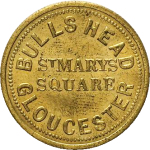
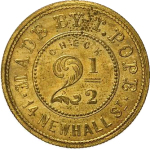
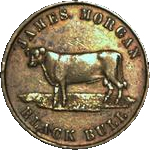
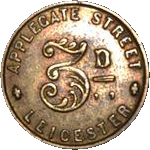
They are predominantly round, made of brass and around 23-26mm in diameter. Other shapes do occur: oval, octagonal, hexagonal, rectangular, square and extremely rarely a star, shield, heart or triangle. Alternative materials are sometimes used: copper, bronze, cupro-nickel, pewter, aluminium, bone and plastic. Sizes can also vary from 18mm up to 32mm or so. The edges can be either milled or plain with the former more common. Overall, although there are regional variations, the vast majority fall within the opening definition.
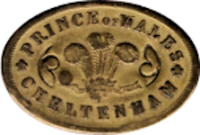
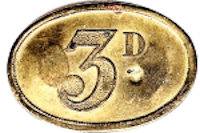
The inscriptions on them can vary from nothing much more than a single word up to full name and address and how they were used. The ‘standard’ on the obverse would be the name of the issuing licensee, the name of the pub, the street/area (in larger towns) and the town or village but one or more of these elements is often absent. Some also include a pictorial device. The most common reverse is a sterling denomination with or without a wreath or other decorative border. A significant proportion also give details of the manufacturer. The denominations can vary from ½d up to 1/- but the great majority are between 1½d and 3d with 1d, 4d and 6d not uncommon. Blank reverses are however quite frequent.
Most are struck but sometimes they are stamped incuse, often on the back of a depiction of Queen Victoria’s head or a double-headed eagle. These are known to collectors as “poor man’s” tokens.
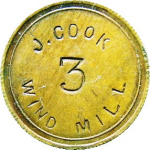
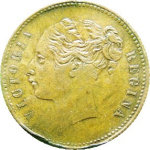
Struck tokens also occur counter-stamped with initials or a name or device, to denote a change of licensee or numerically to define the value.
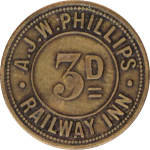
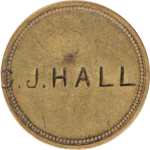
They were chiefly manufactured from around 1850 until the First World War but some continued in use through the 1920s and even beyond. In a few places, checks of a sort are still occasionally found, usually as loyalty rewards or for pre-payment.
As to usage, this could be in whatever way the licensee wished, in order to encourage sales and create loyalty since the checks could only be spent in the issuing pub. They could be used in connection with pub games, wet rent, pub music halls, employee bonuses or advances, pre-payment and promotion or loyalty schemes. Sometimes the purpose is stated on the check but this is not the norm.
To qualify as a pub token, the piece must bear a public house or beer retailer’s name. Comparable checks were utilised for similar purposes by other organisations such as political and working men’s clubs, friendly societies and lodges, brewers and auctioneers but these fall into other categories and are not regarded as pub tokens unless the pub name is also stated.
